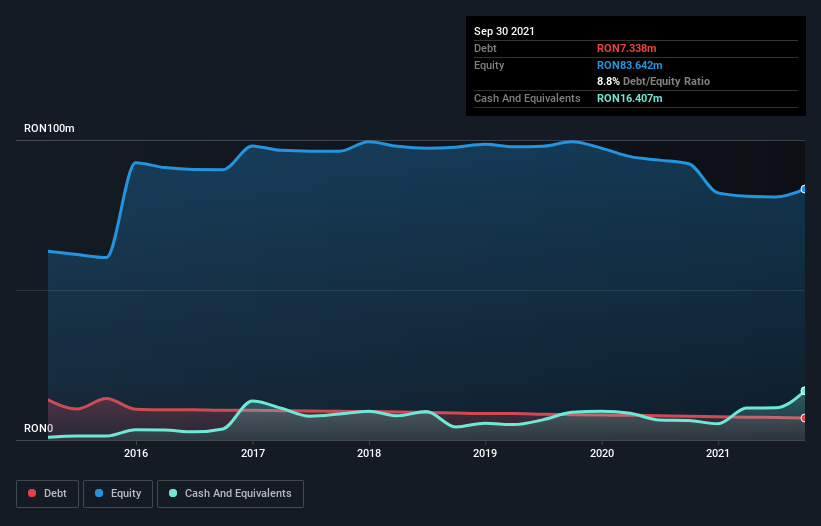David Iben put it well when he said, 'Volatility is not a risk we care about. What we care about is avoiding the permanent loss of capital.' So it might be obvious that you need to consider debt, when you think about how risky any given stock is, because too much debt can sink a company. Importantly, SIF Hoteluri S.A. (BVB:CAOR) does carry debt. But the more important question is: how much risk is that debt creating?
When Is Debt Dangerous?
Debt is a tool to help businesses grow, but if a business is incapable of paying off its lenders, then it exists at their mercy. If things get really bad, the lenders can take control of the business. However, a more usual (but still expensive) situation is where a company must dilute shareholders at a cheap share price simply to get debt under control. Of course, debt can be an important tool in businesses, particularly capital heavy businesses. The first thing to do when considering how much debt a business uses is to look at its cash and debt together.
See our latest analysis for SIF Hoteluri
How Much Debt Does SIF Hoteluri Carry?
You can click the graphic below for the historical numbers, but it shows that SIF Hoteluri had RON7.34m of debt in September 2021, down from RON7.95m, one year before. But it also has RON16.4m in cash to offset that, meaning it has RON9.07m net cash.

How Healthy Is SIF Hoteluri's Balance Sheet?
We can see from the most recent balance sheet that SIF Hoteluri had liabilities of RON6.08m falling due within a year, and liabilities of RON8.46m due beyond that. On the other hand, it had cash of RON16.4m and RON2.44m worth of receivables due within a year. So it can boast RON4.30m more liquid assets than total liabilities.
This surplus suggests that SIF Hoteluri has a conservative balance sheet, and could probably eliminate its debt without much difficulty. Succinctly put, SIF Hoteluri boasts net cash, so it's fair to say it does not have a heavy debt load! The balance sheet is clearly the area to focus on when you are analysing debt. But you can't view debt in total isolation; since SIF Hoteluri will need earnings to service that debt. So when considering debt, it's definitely worth looking at the earnings trend. Click here for an interactive snapshot.
In the last year SIF Hoteluri had a loss before interest and tax, and actually shrunk its revenue by 18%, to RON11m. We would much prefer see growth.
So How Risky Is SIF Hoteluri?
Although SIF Hoteluri had an earnings before interest and tax (EBIT) loss over the last twelve months, it generated positive free cash flow of RON2.6k. So taking that on face value, and considering the net cash situation, we don't think that the stock is too risky in the near term. We'll feel more comfortable with the stock once EBIT is positive, given the lacklustre revenue growth. The balance sheet is clearly the area to focus on when you are analysing debt. However, not all investment risk resides within the balance sheet - far from it. For example, we've discovered 3 warning signs for SIF Hoteluri (1 is a bit concerning!) that you should be aware of before investing here.
If you're interested in investing in businesses that can grow profits without the burden of debt, then check out this free list of growing businesses that have net cash on the balance sheet.
New: Manage All Your Stock Portfolios in One Place
We've created the ultimate portfolio companion for stock investors, and it's free.
• Connect an unlimited number of Portfolios and see your total in one currency
• Be alerted to new Warning Signs or Risks via email or mobile
• Track the Fair Value of your stocks
Have feedback on this article? Concerned about the content? Get in touch with us directly. Alternatively, email editorial-team (at) simplywallst.com.
This article by Simply Wall St is general in nature. We provide commentary based on historical data and analyst forecasts only using an unbiased methodology and our articles are not intended to be financial advice. It does not constitute a recommendation to buy or sell any stock, and does not take account of your objectives, or your financial situation. We aim to bring you long-term focused analysis driven by fundamental data. Note that our analysis may not factor in the latest price-sensitive company announcements or qualitative material. Simply Wall St has no position in any stocks mentioned.
About BVB:CAOR
SIF Hoteluri
Operates hotels and other accommodation facilities in Romania.
Adequate balance sheet with slight risk.
Market Insights
Community Narratives



